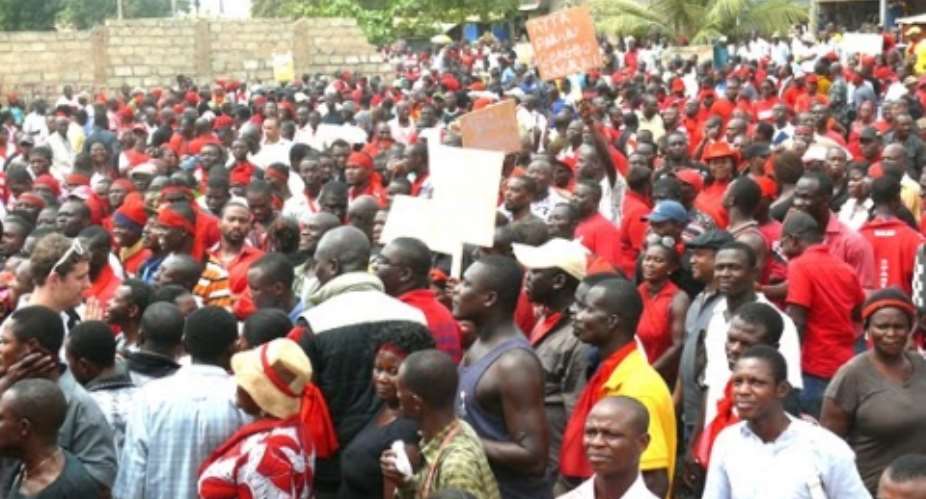The Centre for Policy Research (CPR) has observed with deep concern the ongoing public discourse and discussions about increases in the utility tariffs announced recently by the Public Utility regulatory Commission (PURC).
While in principle CPR is opposed to hikes in utility tariffs and their undeniable adverse effects on Ghanaians, the Center holds the view the TUC's attempt to embarrass government with a call for one-day nationwide strike is not only archaic; it is unfortunate, irresponsible, and unacceptable.
PURC, as the institution that regulates aspects of public utilities, is established as an independent organization primarily to insulate the fixing of utility prices from the manipulation of politicians and elected officials.
It is against this background that the PURC works in close collaboration with representatives of service providers, organized labour, employers' associations, industry actors, and consumers in determining the appropriate levels of utility tariffs. As per the analysis of CPR, PURC as a public institution fixes tariffs based on empirical facts and data considering affordability by consumers and service sustainability.
Government has through the implementation of the Single Spine Salary improved aspects of the working conditions of Ghanaian workers; hence what is expected from organized labour is reciprocity in the form of high levels of productivity rather than threats of industrial actions.
Ghana deserves better than this politically narrow minded, senseless, and selfish approaches being adopted by selected unions in the country to undermine government and independent state institutions. We must allow established statutory institutions to work.
If the TUC could not use its position on the PURC tariffs adjustment committee to persuade the PURC; and the majority view is that the recent increases are within reasonable limits, then the TUC leadership must respect that decision and desist from threatening the nation. The recent “dum sor dum sor” experienced in the country, are shadows of what might become of our nation permanently if government yields to TUC's demands.
The committee of experts established by Vice President Paa Kwesi Amissah-Arthur to examine the tariffs has revealed that any further reduction in the tariffs will be unsustainable and will rather create further difficulties in utility service delivery. Indeed, our own analysis point to the fact that any reduction in the tariffs will result in deplorable quality of services. Under the circumstances, the TUC will better serve the interest and welfare of its members if it demands improvement in the quality of public services such as water and electricity, and monitors same on regular basis.
It is imperative for the leadership organized labour especially the TUC be cognizant of the fact that its membership of about four hundred thousand Ghanaians deserve better than the persistent threat of industrial action. Labour unions are often called social partners because of the crucial developmental roles expected of them. TUC and other unions in Ghana must learn to adopt a more sophisticated approach to dealing with issues of welfare and improvement in labour market conditions of Ghanaians workers.
CPR thus, urges the TUC to immediately withdraw its one-day strike action slated for November 18, and consider investing in a monitoring mechanism that will check the operations of the utility service operators, as well as, negotiate more effectively and efficiently ensure Ghanaians workers benefit from affordable housing schemes, reliable transport systems, and sustainable social security arrangements.
Similarly, CPR expects the utility companies in Ghana to demonstrate a high sense of value for money approach to the services they offer. When service quality is appreciable, it is less likely that tariff adjustments will generate the kind of public debate our nation has been subjected to over the years. Again, while the onus lies on the utility companies to ensure that wastage and deliberate abuse of the public utilities through thievery and illegalities are prevented, CPR urges Ghanaians to use services subsidized by the state with a high sense of responsibility.
Government must take immediate steps to ensure that any unlawful strikes are met with immediate withdrawal of wages and salaries, and where necessary dismissal of the workers involved. It is will be against the legislation that established the PURC if government intervenes in the fixing of utility tariffs, and it will be against the principles of natural justice for government as the largest consumer of utilities to reduce the tariffs announced by the PURC.
Signed
Gloria Edusei
Exectuive Director





 Election 2024: Power outages will affect NPP – Political scientist
Election 2024: Power outages will affect NPP – Political scientist
 NPP is 'a laughing stock' for luring 'poster-stickers', 'noisemaking babies' wit...
NPP is 'a laughing stock' for luring 'poster-stickers', 'noisemaking babies' wit...
 Dumsor: Matthew Opoku Prempeh must be removed over power crisis – IES
Dumsor: Matthew Opoku Prempeh must be removed over power crisis – IES
 PAC orders WA East DCE to process requests from their MP
PAC orders WA East DCE to process requests from their MP
 Defectors who ditched Alan’s Movement to rejoin NPP were financially induced – A...
Defectors who ditched Alan’s Movement to rejoin NPP were financially induced – A...
 Dumsor: Akufo-Addo has taken Ghanaians for granted, let’s organise a vigil – Yvo...
Dumsor: Akufo-Addo has taken Ghanaians for granted, let’s organise a vigil – Yvo...
 April 23: Cedi sells at GHS13.66 to $1, GHS13.07 on BoG interbank
April 23: Cedi sells at GHS13.66 to $1, GHS13.07 on BoG interbank
 GRA clarifies tax status of resident individuals earning income abroad
GRA clarifies tax status of resident individuals earning income abroad
 2024 elections: NDC to officially unveil Jane Opoku-Agyemang as running mate tom...
2024 elections: NDC to officially unveil Jane Opoku-Agyemang as running mate tom...
 Bawumia embarks on working visit to Italy and the Vatican to boost bilateral tie...
Bawumia embarks on working visit to Italy and the Vatican to boost bilateral tie...
